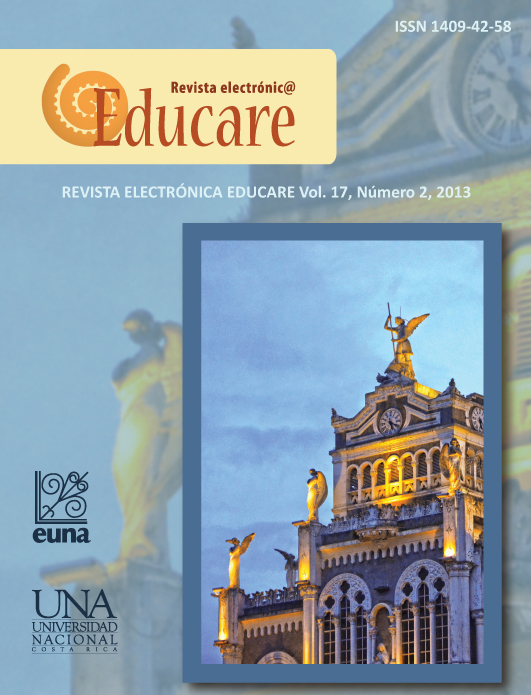Rural Environmental Teaching in Basic General Education
DOI:
https://doi.org/10.15359/ree.17-2.4Keywords:
Environmental education, sustainable development, community participation, Nicaragua, BelizeAbstract
This paper, based on the Nicaraguan and Belizean contexts, points out the need of providing environmental education to students from the 1st to 6th grades of the Basic General Education to ensure that young generations will live in harmony with nature, which will depend on their healthy practices to protect the planet. For this, we attempt to stimulate the interest of teachers to create environmental teaching/learning strategies in an organized, planned, conscious way to raise students’ awareness and love for their culture and community, and for students to aspire to live
in healthy homes. This way, students will succeed in the coexistence experience, in the material and spiritual cultures, and in the economic and development areas.
References
Belize Audubon Society. (2008). An Environmental Agenda for Belize 2008-2013. Full Report [Una
agenda ambiental para Belice 2008-2013 Informe completo]. Belize: Autor. Recuperado
de http://www.belizeaudubon.org/documents/publications/EnvAgenda-FullReport-web.
División General de Currículo y Desarrollo Tecnológico. (2009). Currículo nacional básico. Diseño
curricular del subsistema de la educación básica y media nicaragüense. Recuperado de
http://www.nicaraguaeduca.edu.ni/uploads/DisenoCurricular.pdf
Gadotti, M. (2001). Pedagogía de la Tierra y cultura de la sustentabilidad. Recuperado de http://
www.rebelion.org/hemeroteca/ecologia/pedagogia251001.htm
Ortega, N. y Velasco, E. (2006). Manual de educación ambiental para escuelas primarias del estado
de Guanajuato. México: Fundación de Apoyo Infantil e Instituto de Ecología del Estado.
Solís, V., Madrigal, P., Borrasé, Á y Coto, P. (1998). Ley no. 7786 educación participativa sobre la
gente y la naturaleza la Ley de biodiversidad de Costa Rica. San José, Costa Rica: UICN.
Downloads
Published
How to Cite
Issue
Section
License
1. In case the submitted paper is accepted for publication, the author(s) FREELY, COSTLESS, EXCLUSIVELY AND FOR AN INDEFINITE TERM transfer copyrights and patrimonial rights to Universidad Nacional (UNA, Costa Rica). For more details check the Originality Statement and Copyright Transfer Agreement
2. REUTILIZATION RIGHTS: UNA authorizes authors to use, for any purpose (among them selfarchiving or autoarchiving) and to publish in the Internet in any electronic site, the paper´'s final version, both approved and published (post print), as long as it is done with a non commercial purpose, does not generate derivates without previous consentment and recognizes both publisher's name and authorship.
3. The submission and possible publication of the paper in the Educare Electronic Journal is ruled by the Journal’s editorial policies, the institutional rules of Universidad Nacional and the laws of the Republic of Costa Rica. Additionally, any possible difference of opinion or future dispute shall be settled in accordance with the mechanisms of Alternative Dispute Resolution and the Costa Rican Jurisdiction.
4. In all cases, it is understood that the opinions issued are those of the authors and do not necessarily reflect the position and opinion of Educare, CIDE or Universidad Nacional, Costa Rica. It is also understood that, in the exercise of academic freedom, the authors have carried out a rogorous scientific-academic process of research, reflection and argumentation thar lays within the thematic scope of interest of the Journal.
5. The papers published by Educare Electronic Journal use a Creative Commons License:














 The articles published by Educare Electronic Journal can be shared with a Creative Commons License:
The articles published by Educare Electronic Journal can be shared with a Creative Commons License: 



